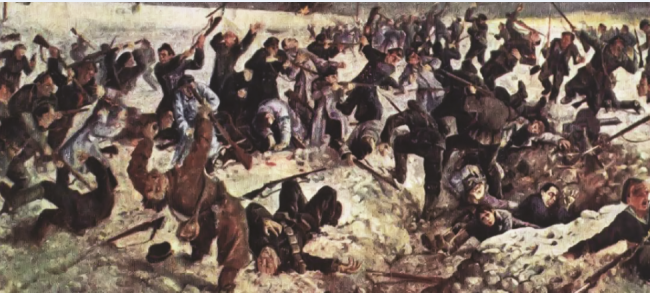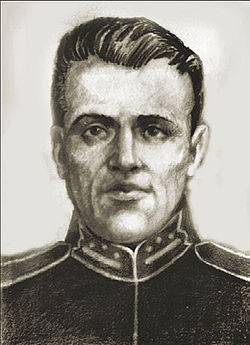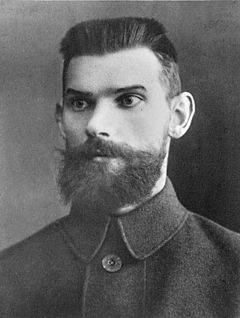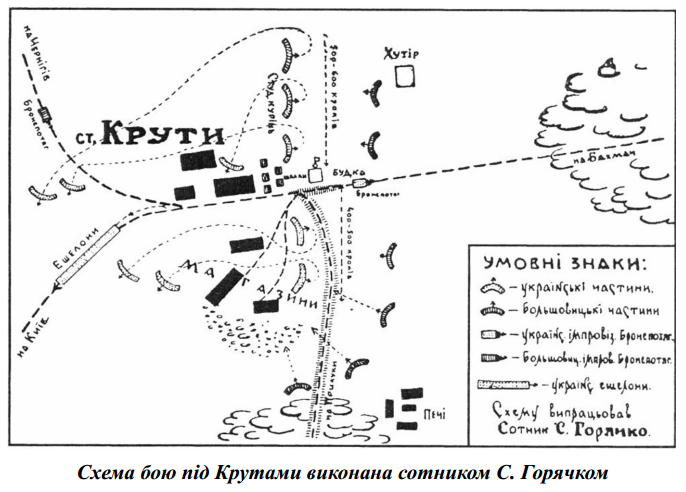"Three hundred Spartans" of the Central Council. Myth and truth of the Battle of Kruty

The Battle of Kruty took place on 16 (29) on January 1918 of the year, exactly one hundred years ago. In modern Ukraine, the anniversary of the battle is celebrated annually as a memorial day for the defenders of the independent state. Meanwhile, who and then defended Ukraine from whom is a moot point. After the February revolution occurred in Petrograd in 1917, the nationalist forces became active in a number of regions of the former empire. Little Russian provinces were no exception.
From the end of the 19th century, Austria-Hungary, who was deathly afraid of the growth of Russian influence on the Slavic peoples of Eastern Europe, played the map of "political Ukrainians". At the beginning of the twentieth century, Germany joined it, which also had its own interests - political and economic - in supporting Ukrainian nationalism. Since the beginning of the First World War, when Germany and Austria-Hungary went to war with Russia, the significance of Ukrainian nationalism for German and Austro-Hungarian interests increased - it had to turn into a destructive principle, destabilizing the situation in the Russian provinces of the empire. By the time the monarchy collapsed in Russia, forces were already operating in Kiev, ready to separate the Little Russian lands and create a new state — Ukraine.
The Ukrainian Nationalists created the Central Rada, which already in June 1917 proclaimed the territorial autonomy of Ukraine within Russia. The Provisional Government missed this event, as it was distracted by the First World War and the issues of preserving its own power. When in October 1917, the second revolution in a year took place in Russia - the October, Central Rada in Kiev, having decided that the Russian state had collapsed completely, headed for Ukraine’s independence.
Already 20 November 1917, the Malaya Rada proclaimed the creation of the Ukrainian People's Republic in federal ties with Russia. Moreover, Ukraine included vast lands that were not Little Russia, namely, the territories of Yekaterinoslav, Kharkov, Kherson provinces and a part of the territories of Tauride, Voronezh and Kursk provinces. However, the Rada authorities were in no hurry to recognize, firstly, the Bolshevik-controlled Soviets, which had the strongest positions in industrial centers and formed the Donetsk-Krivoi Rog Republic, and secondly, various independent political forces such as the anarchists of Nestor Makhno in Gulyai-Polye.
The Central Rada was so weak that it could not count on serious military support. Although Rada formally controlled military units totaling about 20 thousands of people, in reality, it could hardly gain several thousand armed supporters. Meanwhile, in January 1918, a detachment under the command of Social Revolutionary Mikhail Muravyev was sent to Soviet power in Kiev. While supporters of the Soviet government were moving towards Kiev, the leaders of the Rada convulsively figured out whom they could oppose. As a result, a detachment of a total number of 420 people was formed. It includes 250 officers and cadets of the 1-th Ukrainian military school, 118 students and high-school students who were part of the 1-th hundreds of Student smoking, about 50 volunteers.

The commander of the detachment, a hundred years later called “the defenders of separatism”, was appointed a very remarkable man - Averky Goncharenko (1890-1980). However, his most outstanding qualities were already revealed much later than the events at Kruty. Then, in January, 1918, Averky was the 27-year-old commander of the smoking quarters of the 1-th Ukrainian Military School named after Bogdan Khmelnitsky. Goncharenko had several years of service in the Russian army — first he graduated with honors from the Chuguev Military School in 1912, then served in the 260 Infantry Bratslavsky Regiment, participated in the First World War and reached the rank of captain, having managed to command a company and battalion. George Knight Goncharenko, who had battle wounds, was appointed a teacher in the Kiev school of ensigns, and after the proclamation of the UPR, he supported Ukrainian nationalists and headed the henchman in the 1 Ukrainian military school created.
 Imposing forces were attacking the cadet detachment - around 3000 a man with an artillery battery and an armored train. He commanded the Soviet detachment Reinhold Berzin (1888-1938), almost the same age as Goncharenko with a slightly similar biography. True, Berzin was an old Bolshevik, an underground worker, who had spent a year in prison for distributing revolutionary literature. But in the First World War, he was drafted into the army, graduated from the school of ensigns and served in combat units, participated in the First World War, received the rank of lieutenant. Berzin supported the October Revolution and took an active part in the establishment of the Soviet regime in Ukraine.
Imposing forces were attacking the cadet detachment - around 3000 a man with an artillery battery and an armored train. He commanded the Soviet detachment Reinhold Berzin (1888-1938), almost the same age as Goncharenko with a slightly similar biography. True, Berzin was an old Bolshevik, an underground worker, who had spent a year in prison for distributing revolutionary literature. But in the First World War, he was drafted into the army, graduated from the school of ensigns and served in combat units, participated in the First World War, received the rank of lieutenant. Berzin supported the October Revolution and took an active part in the establishment of the Soviet regime in Ukraine.In the area of the railway station Kruty (Nezhinsky district of Chernihiv region), that in 130 km from Kiev, the advancing Soviet detachment of R. Berzin came across the Ukrainian squad of Goncharenko. In fact, the leadership of the Central Rada sent untried Ukrainian cadets and students for slaughter, since the enemy outnumbered several times, plus it was much better armed and prepared. What the Ukrainian authorities call heroism now was in fact a crime by the Central Rada and a crime, first of all, in relation to its own supporters - young cadets and students.
The historian Dmitry Doroshenko, who served as general secretary of the Central Rada, is difficult to blame for anti-Ukrainian sentiment. But what he tells in his memoirs about the events at Kruty, completely breaks the official propaganda version of the modern Ukrainian government. As Doroshenko testifies, while the Ukrainian detachment was waiting for the advancing Soviet forces, a real binge started on the train, on which the cadets arrived at the station. Participated in her senior officers of the squad. It turns out that cadets and students, armed only with rifles, were left to themselves, without guidance from experienced commanders.

When the Soviet detachment approached, it was able to suppress the resistance of the cadets without much difficulty. Although the Ukrainian authorities are talking about 200-300 dead, contemporaries recalled far fewer losses. Most of the fighters of the detachment headed by Goncharenko himself immediately retreated. A platoon of students in full force was captured. Subsequently, the captured students were shot. The time was brutal, and the Muravyev Soviet units that had entered Kiev were shocked by the news that the Central Rada had sunk the working uprising on Arsenal in blood. By the way, it was precisely the suppression of the workers uprising that occupied the main forces of the Rada numbering 3000 people, among whom was Simon Petlyura and his companions. While the “backbone” of the separatist army was cracking down on the insurgent workers, poorly trained students and cadets were sent to meet the well-armed detachment of Muravyov-Berzin.
After the Muravyev squad occupied Kiev, the Central Rada fled to Zhytomyr. About any resistance to the last drop of blood "ardent patriots" from the Rada and did not think. But they did not want to lose the dream of full power over Ukraine, why they immediately preferred to enlist the support of long-time patrons - Germany and Austria-Hungary. In March, 1918, relying on the support of the German and Austrian troops, the government of the Central Rada reoccupied Kiev.
The myth of the Battle of Kruty began to be created already at that time, a hundred years ago. First of all, the leaders of the Central Rada, who needed the glorification of the struggle against the Bolsheviks, were interested in it and at the same time wanted to shift attention from their flight to Zhytomyr to a more heroic, from their point of view, battle at Kruty. Mikhail Hrushevsky, a leading ideologue of the Central Council, and became the direct author of the myth. 19 March The 1918 of the year at the Askold Grave in Kiev was held a solemn ceremony for the reburial of the remains of the 18 fighters of the Ukrainian detachment who died at Kruty.
Germany, having gained control of Kiev, was not going to share power with any Rada. Already in April, 1918, the Central Rada was dispersed. Another page in the history of a sad project called “Ukraine” turned over, but there were still many interesting pages ahead. And one of them did not pass by the “main character” of the battle under Averky Goncharenko's Kruty.
Everyone who gets acquainted with the history of the Battle of Kruty, inevitably raises the question - if the defenders of Kiev are really “Ukrainian three hundred Spartans,” as they like to call them in modern Ukrainian propaganda literature, then why didn’t their combat commander Averky Goncharenko die? After all, the man he was, in principle, was not a coward — the George Knight, a truly brave officer, who went through the First World War and quickly made a career in the Russian army. The answer is simple - there was no serious battle, and as a result of the clash, most of the “Ukrainian Spartans” simply retreated, among them was the commander.
Averky Goncharenko, in contrast to the Soviet commanders of Social Revolutionary Mikhail Muravyov, who was executed in 1918 for the anti-Bolshevik insurgency, and the Latvian shooter Reingold Berzin, who had been repressed in 1938, was lucky enough to live for almost a century. After the battle of Kruty, he served in various administrative positions, first with Pavel Skoropadsky and then with Simon Petlyura. After the civil war, Goncharenko settled in Stanislavov (Ivano-Frankivsk), which at that time was part of Poland. Here he focused on quite peaceful work in the Ukrainian cooperation and, perhaps, would have lived his life quietly and peacefully, if the Second World War had not started.
In 1943, 53-year-old Goncharenko joined the 14 SS Division Galichina. As a man with a military education and quite good combat experience, he, despite his age, turned out to be in demand and received the title of Hauptsturmführer of the SS troops (similar to the Wehrmacht captain). Permission for the formation of the SS division from the Galician Ukrainians was given personally by Adolf Hitler, considering the merits of the Galicians before the Third Reich. Initially, the division was planned as a police officer, so almost the entire officers of the division were German police officers sent from Germany. The rank and file was staffed by Galicians, mostly mobilized in the villages. But there were a few Ukrainian officers, including Averky Goncharenko.
In mid-July, 1944, in the area of the town of Brody, Lviv region, in a battle with the units of the 1 of the Ukrainian Front, the division “Galicia” suffered a crushing defeat. Of the thousands of 11, only 3 thousands who escaped from the environment were saved. Fate once again smiled at Averky Goncharenko, who survived the First World War and did not become part of the “heavenly hundred” during the Battle of Kruty. He broke out of the environment. His further path is not particularly known - he probably took part in the actions of the division against the Yugoslav partisans and the Warsaw Uprising. After World War II, Goncharenko emigrated to the United States of America, where he lived 35 for years and died in 1980 at the age of 90.
Resuscitation of the myth of the Battle of Kruty began in post-Soviet Ukraine. The most actively glorify the events of those old years began under President of Ukraine Viktor Yushchenko. In August, Yushchenko officially opened the memorial to the defenders of Ukraine 2006. A little more than a decade passed and the new “defenders” are already dying in the name of the next Kiev government, whose history and activities are as muddy as the history of the Central Council.
Information